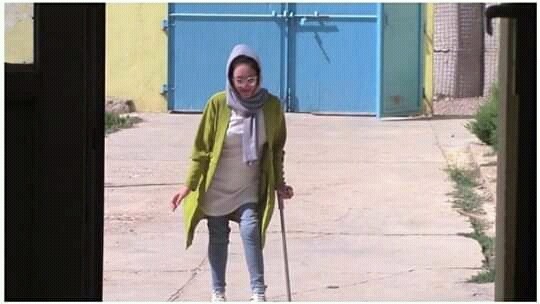Afghanistan. Dowlatyar, Ghor Province. Zarmina Azimi lived a 40 minute walk from her school, but for the young child, the journey took more than two hours; her cane and plastered legs slowed her pace but they could in no way dampen her resolve.
Azimi was a disabled girl who spent her life in the Dowlatyar district of Ghor Province of Afghanistan. As a child, people treated her with discrimination.

Fell and rose to succeed
Azimi fell and rose many times, but she finished school with excellent grades. She did not do well in the entrance exam when she returned from Pakistan where she went for medical treatment, but with the money ($80) she received from the Ghor Martyrs and Disabled Administration, and money her brother provided her, she moved to Kabul and studied law at a private higher education institution in Kabul. She graduated with honors, receiving high marks in her first semester. She received a university scholarship to study for free. This year, she became an attorney and now is using the law to stop violence against women in Ghor.
Inspiration to continue education
“I had two ways. First, to give up and sit at home like any other woman or second, to find a way to move on my way. I thought I better help myself and other women too. I lost my father when I was in grade 8th. From grade 8th to 12th, I walked 4 hours every day to school. Because there was no car in the street, I had no father and my brothers were small. I had a stick only,” she said in an interview with Transcontinental Times.
According to the Ghor Department of Martyrs and Disabled, 2,674 disabled people are registered in the province. After the supreme court announced vocational jobs for disabled people, she attended the competitive exam and was selected out of 137.
Discrimination facing disabled people
Azimi said people do not believe in the abilities of disabled people. “I saw a lot of discrimination until graduation. No one ever admired me as a young girl. There are even some educated people who look at me as an incomplete person,” she said. She believes that culture and economy can never be obstacles for a person’s development if he/she wants.
“Being disabled is never a means of limitations. I am a woman and a disabled. If women want and believe in their abilities, they can [be brighter than] than me.”
“In Afghanistan, rights are not given, rights are taken”
Azimi believes if women hide their wishes under their chadars (head scarves) and accept themselves as a second class citizens because of their gender, they will never improve. “I know the traditional life, but if women stay silent, no one will offer them their rights. If they do not move toward education, they will not find out about their rights,” she said. She believes they will also look to themselves just as a patriarchal society looks at them.
Inspiration for future
“I want to work for disabled people, women, and children, who are of the most vulnerable in of society. I want to take my master’s degree and go beyond. People still treat me with discrimination. They think I became an attorney because it was a privilege for my state. They do not believe in me, even though I succeeded in the position through a competitive exam.”

